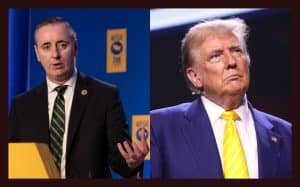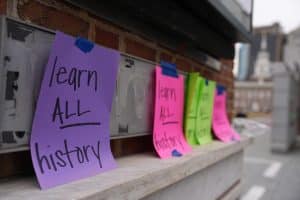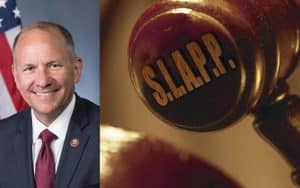Robert P. Jones’ latest book is The Hidden Roots of White Supremacy and the Shared Path to an American Future (Simon & Schuster). The publisher says of the book, “Beginning with contemporary effects to reckon with the legacy of white supremacy in America, Jones returns to the fateful year when a little-known church doctrine emerged that shaped the way five centuries of European Christians would understand the ‘discovered’ world and the people who populated it.”
The New York Times hailed the book as “full of insight and urgency,” and Kirkus Reviews called it “Revelatory … A searing, stirring outline of the historical and contemporary significance of white Christian nationalism.”
Jones is president and founder of Public Religion Research Institute (PRRI). His previous books are White Too Long: The Legacy of White Supremacy in American Christianity and The End of White Christian America.
Jones discussed his new book with Church & State Editor Rob Boston.
The main title of your book is The Hidden Roots of White Supremacy. Some Americans United members might think this is not a book about separation of church and state. What’s the nexus?
In my new book, I’m tracing the origins of the audacious claim that Christianity and European civilization were superior to all other religions and societies in the world. This intertwining of church, culture and state formed the bedrock of the European worldview that first landed on the shores of the Americas in the 15th century. It was the animating force that justified the entire settler-colonialist project in what became the United States, including the genocide and forced removal of Indigenous people in the Americas and the kidnapping and enslavement of Africans to exploit the resources of these occupied lands.
This analysis also clarifies how the Christian theology and institutions that justified the European state were always bound up with claims of white/European superiority. One way of understanding the development of the principle of the separation of church and state is to see it as the long effort to expose and dismantle these claims of white supremacy by blocking their appeal to divine European chosenness. In other words, separating church and state not only frees the state from religious favoritism and bigotry, but it also undermines the claims of white supremacy that are always lurking among those favoring theocratic regimes in the West, both historically and today.
You discuss in detail the Doctrine of Discovery. What is that? Why should Americans care about it?
To fully understand the deep roots of today’s white Christian Nationalism, we need to go back at least to 1493 — not the year Christopher Columbus “sailed the ocean blue,” but the year in which he returned to a hero’s welcome in Spain. It was also the year he was commissioned to return to the Americas with a much larger fleet of 17 ships, nearly 1,500 men and more than a dozen priests to speed the conversion of Indigenous people who inhabited what he, along with King Ferdinand and Queen Isabella, still believed were Asian shores.
The return of Columbus in 1493 also marked the high-water mark of one of the most fateful but unacknowledged theological developments in the history of the western Christian Church: the creation of what has come to be known as the Doctrine of Discovery. Established in a series of 15th-century papal bulls (official edicts that carry the full weight of church and papal authority), the Doctrine claims that European civilization and Western Christianity are superior to all other cultures, races and religions. From this premise, it follows that domination and colonial conquest were merely the means of improving, if not the temporal, then the eternal lot of Indigenous peoples. So conceived, no earthly atrocities could possibly tilt the scales of justice against these immeasurable goods.
This papal decree, and others that extended and developed its principles, provided the moral and religious justification for an unfettered European colonial race for “undiscovered lands” and fertilized the blossoming African slave trade.
How does the Doctrine of Discovery affect our politics today?
As I’ve continued my own reeducation journey over the last 10 years, I have come to consider the Doctrine of Discovery as a kind of Rosetta Stone for understanding the deep structure of the European political and religious worldviews we have inherited in this country. The Doctrine of Discovery furnished the foundational lie that America was “discovered” and enshrined the noble innocence of “pioneers” in the story we, white Christian Americans, have told about ourselves. Ideas such as Manifest Destiny, America as a city on a hill or America as a new Zion, all sprouted from the seed that was planted in 1493. This sense of divine entitlement, of European Christian chosenness, has shaped the worldview of most white Americans and thereby influenced key events, policies and laws throughout American history.
Are the leaders of Christian Nationalist groups consciously adopting the Doctrine, or is its influence more subtle?
What we call white Christian Nationalism today draws on this old Doctrine of Discovery impulse, but it is fueled by two recent events: the election of Barack Obama, our first African American president; and large changes in the ethno-religious composition of the population.
As I demonstrated in The End of White Christian America, over the past two decades, the U.S. has gone from being a majority white Christian country to one in which there is no majority ethno-religious group. As recently as 2008, when Obama was first running for president, the U.S. population was still majority white and Christian (54%). But by the time Obama left office in 2017, the proportion of white Christians in the country had dropped to 47%, and it has continued to decline to 42% in 2023.
While few Christian Nationalists know the Doctrine of Discovery by name, you can still see the influence of these 15th-century claims to white supremacy and Christian dominion in contemporary public opinion polling. A 2023 survey conducted by PRRI, where I serve as president and founder, and the Brookings Institution, found that while only 30% of the public agrees that America was ordained by God to be a promised land for European Christians, majorities of white evangelical Protestants (56%) and Republicans (52%) affirm this statement. A sense of nostalgia and grievance connected to this old and threatened vision of America has become the engine of the MAGA movement.
The picture in America can look pretty bleak. The conventional wisdom is that Americans are hopelessly divided. We’re seeing books about our nation’s troubled racial history being targeted for removal from public schools. The Supreme Court is turning its back on church-state separation. Xenophobia remains a problem. Your book talks about a path to “a shared American future.” What is your cause for hope?
When I was researching the book, I spent considerable time with communities in Mississippi, Oklahoma and Minnesota who were working to bring justice and healing to their communities from past experiences of racial violence. One of the most inspiring things I learned from the folks working on the ground in these diverse places was that everyday people working with few resources can come together to tell the truth and make a difference.
READ: A Tale of Two Pastors, and Two Versions of Christianity
To give just one example, a group consisting of descendants of enslaved people and sharecroppers joined hands with descendants of enslavers to tell the story of Emmett Till in Tallahatchie, Mississippi. Their work, over a period of two decades, resulted not only in an apology to the Till family for the injustice carried out in their community but also in the establishment of the Emmett Till and Mamie Till-Mobley National Monument, announced last year by President Joe Biden.
The penultimate chapter in my book is entitled, “The Search for Hope in History.” I concluded the chapter with these words: “The efforts by so many in these local communities show us what can happen when just a few dedicated souls decide to tell a truer story about who we are and then harness the energy unleashed by that confession for creative action. Taken together, along with the myriad of other efforts across the country, they reveal unrealized possibilities of our nation. While the destination seems scarcely discernible on the horizon, these beacons are sufficient, if we persist, to help us chart a new course.”
Is there anything else you would like to add?
Of the twin streams of American history — one claiming America as a White Christian nation and another affirming America as a pluralistic democracy — the former has too often been the dominant, even if not fully conscious, current among white Americans. Despite the polarization and dangers in our current political moment, I remain convinced that the waters of justice are rising in a way that feels different from any other in my lifetime. And I come back often to James Baldwin’s simple wisdom: that despite everything, and even despite ourselves, we can do and be better.
This article was originally published at Americans United for Separation of Church and State and is reprinted here with permission.






